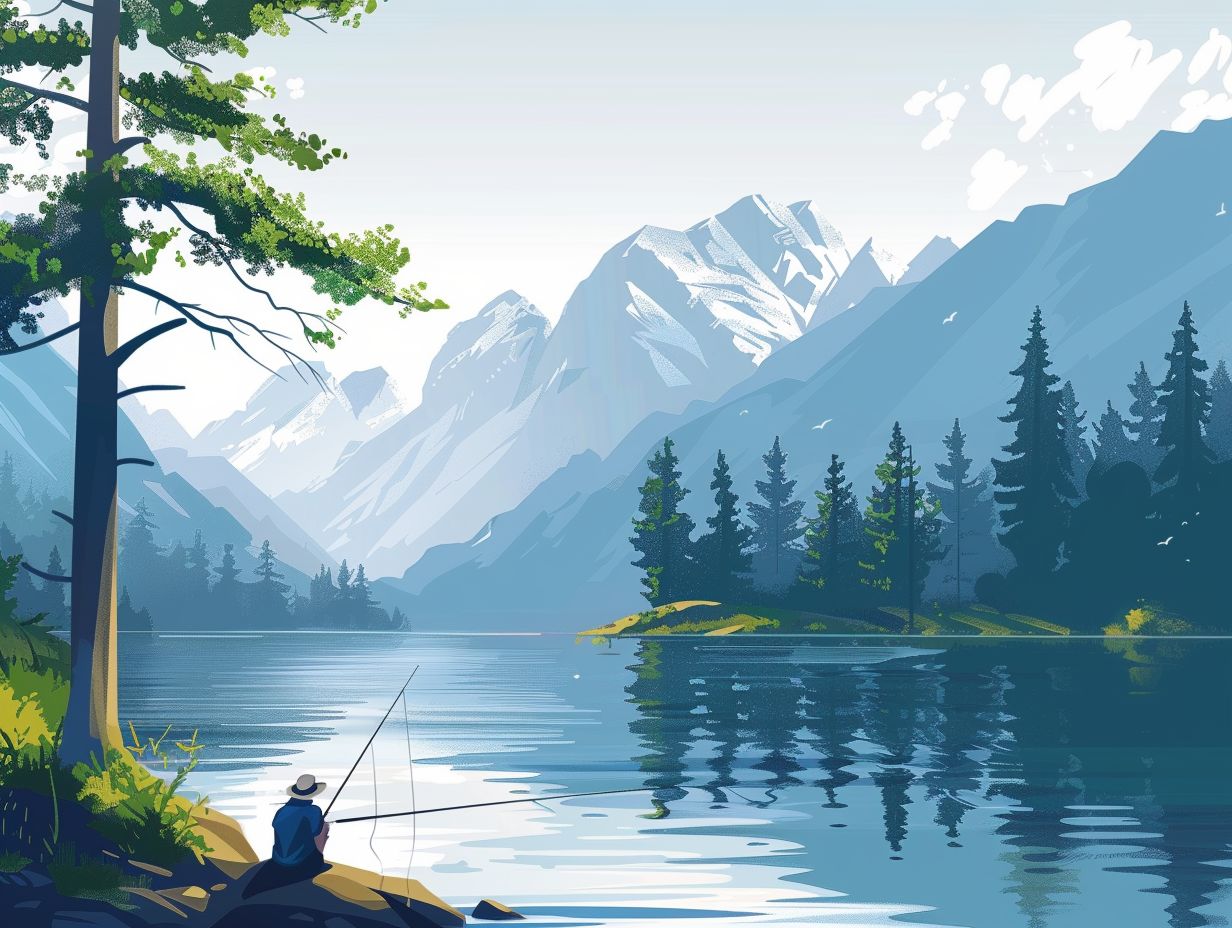If you are an avid angler who enjoys fishing while camping, it is essential to comprehend the repercussions of overfishing and the significance of sustainable fishing practices.
This guide will address selecting appropriate fishing gear, adhering to regulations and permits, employing catch and release techniques, and consuming fish responsibly.
Additionally, alternative activities to fishing will be examined to ensure a complete appreciation of nature during camping. Let us delve into the details and understand how to fish sustainably in order to protect our valuable fish populations.
Key Takeaways:

- It is crucial to practice sustainable fishing while camping to preserve fish populations and maintain a healthy ecosystem.
- Choose fishing gear that is environmentally friendly and avoid methods that cause harm to marine life, such as using gillnets or bottom trawling.
- Before fishing while camping, make sure to research and follow regulations and permit requirements to ensure responsible and legal practices.
The Importance of Sustainable Fishing
Engaging in sustainable fishing is essential for maintaining the delicate balance of ecosystems in the wild. By adopting sustainable fishing practices, you, as an individual participating in fishing activities, play a vital role in preserving biodiversity and safeguarding aquatic habitats.
Responsible angling methods, such as catch-and-release, using biodegradable gear, and adhering to catch limits, allow campers and fishing enthusiasts to actively contribute to conservation efforts. This conscientious approach not only helps protect fish populations but also enhances the overall health of marine and freshwater ecosystems.
Ultimately, it enriches the camping and fishing experiences for all nature lovers while ensuring the long-term sustainability of these environments.
Understanding the Impact of Overfishing
Overfishing poses a significant threat to the sustainability of fish species and the overall health of aquatic ecosystems. It disrupts the delicate balance of marine life, leading to declines in fish populations and impacting the entire ecosystem.
This disruption can have far-reaching consequences beyond just the fish populations themselves. As fish numbers dwindle, it can disrupt the food chain, affecting predators that rely on these fish for sustenance.
This can lead to ripple effects throughout the entire marine ecosystem, with potential impacts on coral reefs, seabirds, and even human populations that depend on fish for food and livelihood. Implementing sustainable fishing practices is crucial to prevent further damage and ensure the health and longevity of our oceans.
Choosing Sustainable Fishing Practices
Choosing sustainable fishing methods and techniques is crucial for promoting conservation efforts and safeguarding fish populations. By embracing sustainable practices, you can play a role in preserving aquatic ecosystems for the benefit of future generations.
When you utilise techniques like selective fishing, which focuses on specific species while minimising bycatch, you help maintain the delicate balance of marine biodiversity. Making use of gear modifications such as circle hooks and escape panels on fishing nets can reduce the unintended capture of non-targeted marine life.
Additionally, implementing regulations on catch limits and fishing seasons can help prevent overfishing and ensure that fish stocks remain robust and healthy. These practices not only have positive environmental impacts but also provide crucial support for the livelihoods of local fishing communities.
Types of Fishing Gear to Use and Avoid
When fishing, it is crucial for you to use gear that aligns with ethical and sustainable methods. Choosing the appropriate fishing equipment can have a significant impact on reducing environmental harm and promoting responsible angling practices. Opting for gear such as circle hooks, which minimise the chances of deeply hooking fish and increase their survival rate when released, represents a positive step towards sustainable fishing.
It is important to avoid gear like gillnets, which have the potential to accidentally trap non-target species and harm marine habitats. By refraining from using such gear, you can help maintain the delicate balance of aquatic ecosystems.
By being conscious of the gear you use, you have the opportunity to play a role in conserving marine life and ensuring the sustainability of fish populations for the benefit of future generations.
Regulations and Permits for Fishing While Camping

Understanding the regulations and obtaining necessary permits for fishing whilst camping is vital for ensuring compliance with local guidelines and protecting water ecosystems. It is essential for you to navigate fishing areas responsibly using maps and GPS to avoid sensitive habitats.
When engaging in fishing activities during camping trips, you should be aware of specific fishing regulations set by local authorities regarding the type and size of fish that can be caught. Adhering to catch limits and size restrictions helps in maintaining a balanced ecosystem in the water bodies.
Campers must dispose of any fishing waste properly to prevent pollution and preserve the natural beauty of the surroundings for future generations to enjoy.
Knowing the Rules and Limits
Being knowledgeable about fishing rules and limits is essential for responsible angling practices. Understanding the regulations regarding fish species, sizes, and catch limits helps maintain sustainable fish populations and ecosystem health. By following these guidelines, you not only contribute to the preservation of various fish species but also ensure that future generations can enjoy the thrill of fishing.
Adhering to catch limits prevents overfishing, which can lead to imbalances in the ecosystem. Conservation efforts in promoting responsible fishing practices are crucial in protecting vulnerable fish populations and maintaining biodiversity.
It is vital for anglers to be aware of local fishing regulations to prevent the depletion of fish stocks and support the overall health of aquatic environments.
Best Practices for Catch and Release
Implementing best practices for catch and release fishing is essential for minimising harm to fish populations and wildlife. Ethical handling techniques and proper release methods contribute to the sustainability of aquatic ecosystems. By applying these practices, you can help maintain healthy fish populations and preserve the delicate balance of marine ecosystems.
Promoting responsible fishing behaviors can safeguard biodiversity and support conservation efforts. Proper catch and release procedures, such as using barbless hooks, minimising fight time, and avoiding excessive handling, can significantly reduce stress on fish, increasing their chances of survival post-release.
This not only ensures a memorable fishing experience for you but also plays a crucial role in promoting sustainable fishing practices and wildlife conservation.
Minimising Harm to Fish Population
Minimising harm to fish populations involves employing effective fishing techniques and proper waste disposal. Utilise bear-safe approved rubbish bins and minimise fish waste to protect fish habitats and ensure the conservation of aquatic ecosystems.
Practising catch-and-release fishing, using barbless hooks, and handling fish with care can significantly reduce stress and injuries to fish populations. Employ responsible angling practices such as utilising circle hooks and minimising bycatch to play a key role in preserving marine biodiversity. Implement designated fish waste disposal areas at fishing sites and raise awareness about the importance of clean waters to help mitigate negative impacts on fish habitats.
Responsible Fish Consumption
When camping, responsible fish consumption entails adhering to sustainable fishing guidelines in both freshwater and saltwater settings. Engaging in ethical consumption practices aids conservation efforts and ensures the long-term viability of fish populations. Anglers must be aware of the repercussions of their actions on fish populations and ecosystems.
Employing catch-and-release techniques whenever possible enables anglers to help maintain the balance of fish populations. Adhering to size and catch limits mandated by local regulations can prevent overfishing and support sustainable fish populations.
Opting for fish species that are abundant and have rapid growth rates can further promote ethical fishing practices and conservation efforts.
By carefully monitoring their consumption habits, anglers can play a vital role in safeguarding fish populations for future generations.
Guidelines for Eating Fish While Camping

When cooking and consuming fish whilst camping, you need to prioritise hygiene and fire safety. It is crucial to follow proper food handling and waste disposal practices to prevent forest fires and protect the natural environment.
Ensure that your cooking equipment is clean and sanitised before use to avoid foodborne illnesses. Thoroughly cook fish to eliminate any harmful bacteria and parasites. Use separate chopping boards and utensils for raw and cooked fish to prevent cross-contamination.
It is important to store leftover fish properly to prevent spoilage. When disposing of waste, adhere to local regulations to minimise impact on the surrounding ecosystem. By following these guidelines, anglers can enjoy delicious fish meals whilst also safeguarding the environment.
Alternative Activities to Fishing
Exploring alternative activities beyond fishing whilst camping provides you, as a camper, with opportunities to connect with nature and engage in community efforts. By practising mountain manners and participating in conservation initiatives, you can enhance your overall outdoor experience.
Engaging in activities like hiking along scenic trails, birdwatching, or stargazing allows you to immerse yourself in the natural beauty of your surroundings and develop a deeper appreciation for the delicate ecosystem.
Additionally, you have the option to join tree planting sessions, clean-up drives, or educational workshops whilst camping to contribute to environmental preservation and cultivate a sense of responsibility towards conserving nature for future generations.
It is essential for campers to adhere to Leave No Trace principles, including proper waste disposal and respecting wildlife habitats, to ensure the preservation of the pristine wilderness for the enjoyment of all.
Other Ways to Enjoy Nature While Camping
When you embrace nature during camping, it is important to engage in activities that support environmental sustainability. By participating in practices like reducing, reusing, and recycling, you can play a vital role in conserving natural resources and reducing your environmental footprint.
To decrease waste while camping, consider bringing reusable containers for food storage instead of disposable items. Packing meals in reusable containers helps in reducing single-use plastics and packaging waste. Opting for refillable water bottles and avoiding the purchase of plastic water bottles are effective ways to minimise waste generation.
Another eco-conscious camping practice is to bring biodegradable toiletries and cleaning products. This choice helps in reducing the introduction of harmful chemicals into the environment. These simple yet significant changes can have a positive impact on preserving the beauty of natural landscapes for the benefit of future generations.
Frequently Asked Questions
What is sustainable fishing while camping?
Sustainable fishing while camping is a way of fishing that minimises the impact on the environment and promotes the longevity of fish populations. It involves using techniques and practices that ensure the continuation of fish populations for future generations.
Why is sustainable fishing important while camping?

Sustainable fishing is important while camping because it helps maintain the delicate balance of the ecosystem and ensures that fish populations remain healthy. It also allows for future generations to enjoy fishing and helps support local communities that rely on fishing for their livelihood.
What are some tips for sustainable fishing while camping?
Some tips for sustainable fishing while camping include using barbless hooks to minimise harm to fish, practicing catch and release, avoiding overfishing, and properly disposing of any fishing equipment or waste. It is also important to follow local fishing regulations and only catch what is necessary for consumption.
Can I still eat the fish I catch while practicing sustainable fishing?
Yes, you can still eat the fish you catch while practicing sustainable fishing. However, it is important to only catch what you need and follow local size and catch limits. It is also recommended to choose smaller, sustainable fish species and avoid overfishing larger, more popular species.
Are there any sustainable fishing techniques I should avoid while camping?
Yes, there are some unsustainable fishing techniques that should be avoided while camping, such as using gill nets, dynamite, or other destructive methods. These methods can harm the environment and deplete fish populations, making it difficult for them to reproduce and maintain healthy numbers.
How can I learn more about sustainable fishing while camping?
There are many resources available to learn more about sustainable fishing while camping. You can look up local fishing regulations, attend workshops or seminars, and ask experienced fishermen or park rangers for tips and advice. You can also do research online or join a local conservation group for more information and support.



